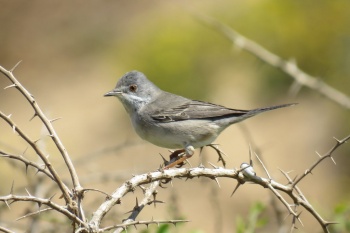Alternative names: Rueppell's Warbler
- Curruca ruppeli
Sylvia ruppeli
Identification
14 cam (5½ in); A typical warbler of the genus Sylvia.
Adult
- Plain grey back
- Paler grey underparts
- Fine pointed bill
- Brown legs
Male
- Black head
- Normally shows a black throat, separated by a white malar streak ("moustache"). *Red eye
Female variable:
- Pale throat - some have black spots
- Head is grey rather than black.
- Brownish tinge to grey back
- Spotted breast recalls Cyprus Warbler.
Similar Species
Slimmer than the similar Sardinian Warbler, and the song is slower and deeper.
Distribution
They breed (April to September) in southern Greece, western Turkey and neighbouring islands. One noted site is on the coast road between Petra and Molivos on the Greek island of Lesvos.
This is a rare vagrant to western Europe.
Taxonomy
This is a monotypic species.[1]
Scientific name sometimes spelled Sylvia rueppelli but that is an unwarranted emendation of the original[3] and no longer accepted.
Some authors place this and other Sylvia warbler species in the genus Curruca[2].
Habitat
Breeds in warm and dry scrubby areas on rocky areas and hillsides.
Behaviour
Breeding
Their clutch contains 4-6 eggs which are laid in a nest in a bush.
Diet
Their diet consists mostly of adult and larval insects and arthropods, with berries being eaten outside of the breeding season.
Vocalisation
Slower, deeper rattle than the Sardinian Warbler.
Movements
They winter in north east Africa.
References
- Clements, J. F., T. S. Schulenberg, M. J. Iliff, S. M. Billerman, T. A. Fredericks, J. A. Gerbracht, D. Lepage, B. L. Sullivan, and C. L. Wood. 2021. The eBird/Clements checklist of Birds of the World: v2021. Downloaded from https://www.birds.cornell.edu/clementschecklist/download/
- Christidis et al. 2018. The Howard and Moore Complete Checklist of the Birds of the World, version 4.1 (Downloadable checklist). Accessed from https://www.howardandmoore.org.
- Aymí, R. & Gargallo, G. (2019). Rüppell's Warbler (Sylvia ruppeli). In: del Hoyo, J., Elliott, A., Sargatal, J., Christie, D.A. & de Juana, E. (eds.). Handbook of the Birds of the World Alive. Lynx Edicions, Barcelona. (retrieved from https://www.hbw.com/node/58970 on 24 May 2019).
- Avian Web
- Birdforum thread discussing identifications of female Rüppell's Warbler
Recommended Citation
- BirdForum Opus contributors. (2024) Rüppell's Warbler. In: BirdForum, the forum for wild birds and birding. Retrieved 18 April 2024 from https://www.birdforum.net/opus/R%C3%BCppell%27s_Warbler
External Links
GSearch checked for 2020 platform.1






